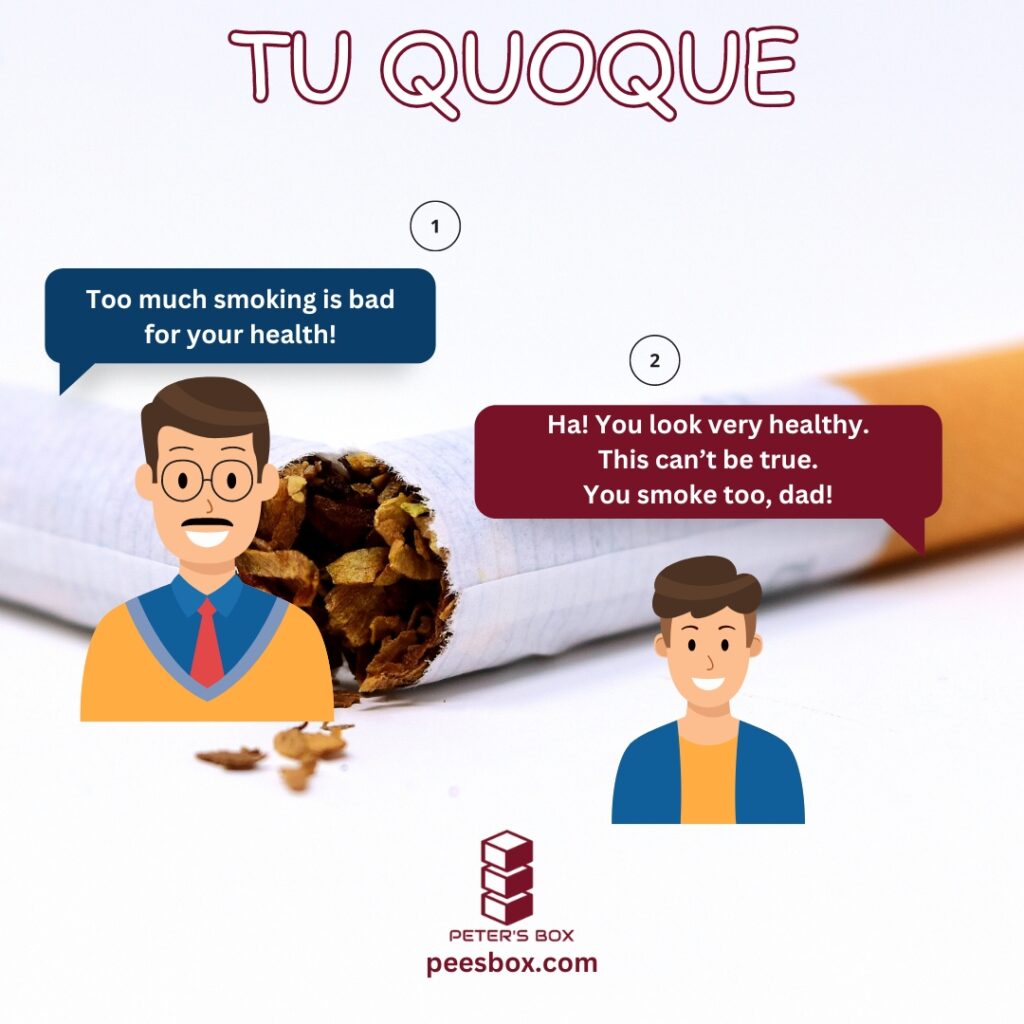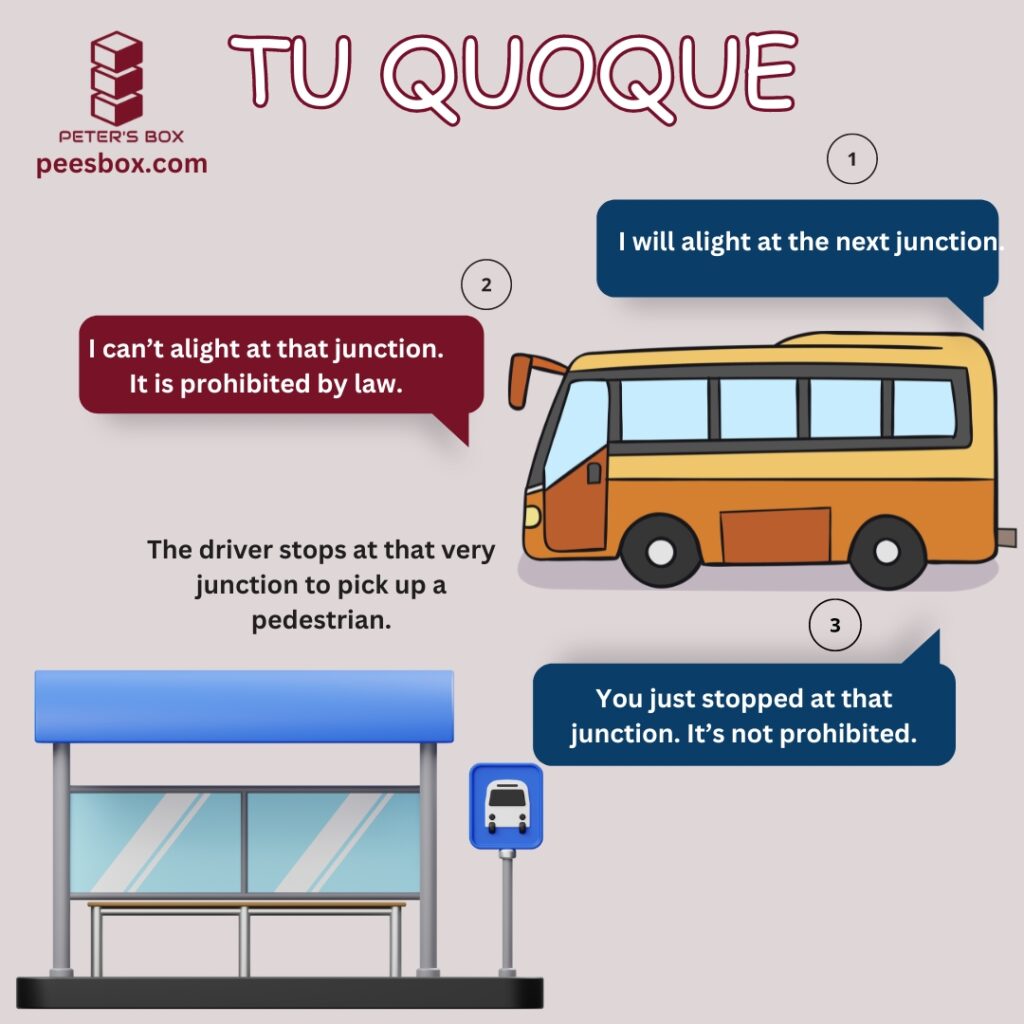Tu Quoque is a logical fallacy I like to call the ‘you too’ fallacy. You will understand why in a second. If you’re not acquainted with logical fallacies, check out the post ‘Beware of the Beast: An Introduction to Logical Fallacies‘ for a quick primer.
What is a logical fallacy?
A logical fallacy is an error in reasoning. It is a flaw that weakens the strength of an argument. It does not always follow that the conclusion is incorrect. It only indicates that the supporting premises (reasons) that were utilised to support the conclusion are flawed and hence not compelling. Furthermore, if you come across a faulty argument, it is preferable not to accept the conclusion unless you are convinced differently. A logical fallacy is the use of defective or otherwise flawed thinking in the creation of an argument that, if overlooked, appears to be well-reasoned.

Tu Quoque
The Tu Quoque ignorance fallacy is an interesting kind of fallacy because it is typical of human nature to point out and deplore hypocrisy. Most of the time, when people commit the Tu Quoque fallacy, they do it because they sense some hypocrisy at play.
Have you ever rejected a claim or argument someone made by pointing out to them that their actions contradict their own claims? Or have you ever said anything like, ‘Look who’s talking’? Have you ever felt that because someone broke the rules, you could also be excused?
If you have, you are already familiar with the workings of the Tu Quoque fallacy. Appeal to hypocrisy is another name for the Tu Quoque fallacy. Tu Quoque in Latin means ‘You Too’.
Tu Quoque fallacy might also be called:
- ‘You too’ fallacy
- ‘Look who’s talking’ fallacy
- ‘Two wrongs’ fallacy
- ‘Pot calling the kettle black’ fallacy
Definition of the fallacy
A logical fallacy that leverages the seeming hypocrisy, inconsistency, or contradiction of a person’s actions towards a claim and rejects or accepts the claim as true or false is known as Tu Quoque. Let us begin with a simple definition. When a proposition is rejected as untrue because the actions of the person making the claim contradict the claim, this is known as Tu Quoque.
Structure of the fallacy
The fundamental structure of an argument from ignorance is as follows:
A claim has been made; the actions of the person making the claim contradict the claim, and therefore it must be false. OR
A claim has been made; the actions or past utterances of the person making the claim are inconsistent with the claim, and therefore it must be false.
Example #1
Father: Too much smoking is bad for your health!
Son: Ha! You look very healthy. This can’t be true. You smoke too, dad!
In this scenario, the son has committed the Tu Quoque fallacy. He points out that even though he is told that smoking is unhealthy, his father seems to be in good health, despite the fact that he smokes.

Example #2
Kofi: Exercising keeps one healthy.
Ama: What do you know?! You never go to the gym. You are always lying in bed. See how fat you are!
In this example, Ama has committed the Tu Quoque fallacy. Ama ignores the proposition that exercising keeps one healthy simply because Kofi does not appear to follow any fitness plan. Instead of concentrating on Kofi’s claim about the benefits of exercise, Ama focuses on Kofi’s approach to exercise.

Common formats
There are certain typical statements used in arguments that will most likely indicate that a Tu Quoque fallacy has been or is about to be committed. Here are a few examples:
- You too!
- See who’s talking!
- You do it too!
- See the pot calling the kettle black!
Example #3
Passenger: I will alight at the next junction.
Driver: I can’t alight at that junction. It is prohibited by law.
The driver stops at that very junction to pick up a pedestrian.
Passenger: You just stopped at that junction. It’s not prohibited.
In this example, it is evident that the passenger is upset since the driver did not comply with his request. He feels cheated since the driver stated that he could not stop at the junction but then proceeded to pick up a pedestrian at the same junction. The passenger probably believes that two wrongs make a right. Why am I unable to get off at a prohibited junction if you are able to pick up a person there?
The passenger has committed the Tu Quoque fallacy because he ignores the fact that the law prohibits stopping at the junction and instead blames the driver’s actions.

Why Tu Quoque is a fallacy
Tu Quoque is a flaw in reasoning because it disregards the facts of the situation and rather focuses on the behaviour or actions of the person proposing the argument. This fallacy assumes that since the person’s actions are inconsistent or contradictory to the very claim the person is making, that claim must be false. A person’s behaviour or actions are inconsequential to the truth value of a claim. A claim will be intrinsically true or false regardless of the external actions or behaviours of the person making it.
One more example
Ex-President: The electricity crisis is terrible and needs to be fixed. The government needs to devise a solution as soon as possible. Businesses are dwindling due to the frequent power outages.
President: See who’s talking! The electricity crisis was worse during your time as president.
Mr. President, the fact that the electricity crisis happened during the tenure of the ex-president does not mean we are not experiencing an electricity crisis during your tenure. The problem at hand is the electricity crisis, not what happened in the past. Mr. President, you are committing the Tu Quoque fallacy. Pointing out that the electricity crisis under the tenure of the ex-president was worse doesn’t mean the electricity crisis should be acceptable now. The fact of the matter is that the electricity crisis is affecting businesses. What are you going to do about it?

Related fallacies
Tu quoque is a type of ad hominem argument. Ad hominem is more commonly used to describe ‘attack on person’ arguments that are usually inflammatory and abusive. The Ad hominem fallacy will be covered in greater detail in another post.
How to avoid
When you hear a claim, don’t be quick to write it off because the person making the claim has acted inconsistently or contradictorily to the claim some time ago. That will only be attacking the person’s actions instead of dissecting the content of the claim. If you are tempted to shout, ‘You do/did it too!’ you are likely going to commit the Tu Quoque fallacy.
What’s next in Peter’s Box? ¡Hasta luego amigos!





